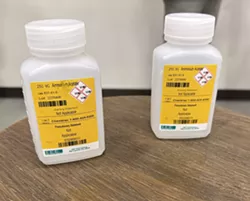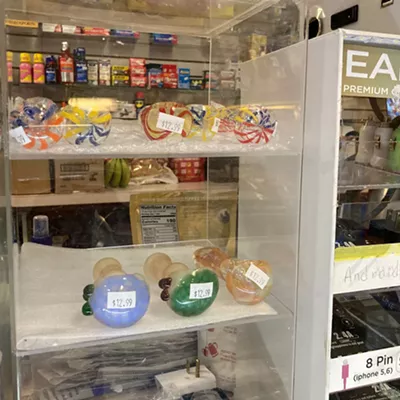
On Wednesday, federal, state and local officials gathered in Airway Heights to encourage West Plains residents to sign up for free water testing.
The Environmental Protection Agency has started testing private well water east of Hayford Road and north of the freeway to learn whether PFAS (per- and polyfluoroalkyl substances) are contaminating those private water sources.
The nearly 15,000 chemicals in the PFAS family are often referred to as "forever chemicals" because of their resistance to breaking down in the environment. They bioaccumulate in the body and are linked with a variety of health issues, ranging from reproductive health problems to kidney and testicular cancer.
PFAS are found in high concentrations in firefighting foam used to battle fuel fires, and until recently, military bases and airports were required to keep that foam on hand and train with it. The foam was often washed away outside, where it could infiltrate into groundwater.
Since first testing for and finding high levels of PFAS near Fairchild Air Force Base in 2017, the military has provided PFAS tests for private wells west of Hayford. But properties near the Spokane International Airport, which sits just east of Hayford, were not included in that testing zone.
The new tests, which were requested by the Washington state Department of Ecology, are intended to fill in knowledge gaps and help more residents understand if they are being exposed.
"What's happening here in the West Plains is happening in communities all over the country, where public drinking water systems are now facing the prospect of trying to remove these chemicals," said EPA Region 10 Administrator Casey Sixkiller. "Nothing can get fixed if we don't measure it. ... We need to know the enemy, if you will."
People can sign up for that free testing here.
If the tests conclude that PFAS levels are higher than state health standards, Ecology will offer those property owners assistance.
Ecology Director Laura Watson said that the agency already has an emergency contract in place to provide bottled water if needed, and the state will work with homeowners to install filtration systems as necessary.
"We know that taking action is more important than ever, and it's clear that there's a really strong desire for water testing in the community," Watson said. "We're committed to comprehensively ... investigating and cleaning up PFAS contamination in the West Plains so that we have that long-term protection of human health and the environment."
So far, the EPA has had 144 eligible residents sign up for the free tests, but officials estimate there are about 300 private wells in that area that could be tested, and they encourage everyone to sign up for the free process.
The samples will be collected and sent to an EPA lab in Western Washington, and results will be confidentially reported back to homeowners.

Ecology and the EPA hope that those homeowners will then share their results with Ecology, which has funded an Eastern Washington University study to better understand how PFAS contamination flows through the underground aquifers and paleochannels on the West Plains.
Dr. Francisco Velazquez, the health officer for Spokane Regional Health District, said the tests can provide important context for residents' primary care providers, as those results can help doctors understand what kind of exposure risk their patient has.
"Our members of the community are concerned, and I think we need to acknowledge that," Velazquez said. "The best way to alleviate concern is to have information, to have knowledge, and then with that knowledge, act. The testing that is being offered here by our partners is the first step in addressing that concern."
Spokane County Commissioner Al French thanked the EPA and Ecology for their leadership in bringing the testing to the area.
"The importance of being able to do the testing is it provides data, and with data we can start to design a solution for long-term restoring good quality drinking water to the West Plains," French said. "Please get your well tested."
Since October, Ecology has been working on an agreed order with the Spokane International Airport to move forward with a plan to better understand PFAS contamination there and start working toward cleanup. After multiple delays in that process, if Ecology and the Airport don't finalize that agreement by Monday, March 11, Ecology has said it will take enforcement action.
Ecology started working toward that plan after learning that the airport had found PFAS in tests in 2017, but didn't report that to the state.
When asked why it's taken seven years to get testing for those near the airport, French said, "Airport leadership is working with the Department of Ecology and the Federal Aviation Administration because some of the contamination that we've experienced on the airport is a direct result of directives that we got from the FAA. So, that process is underway and they'll be working to resolve that between the three agencies."

























